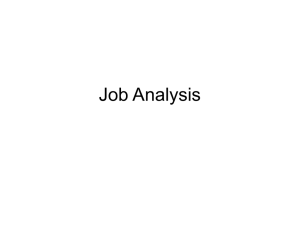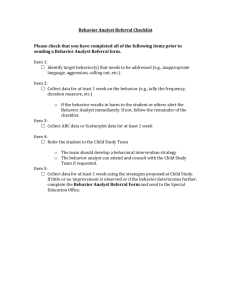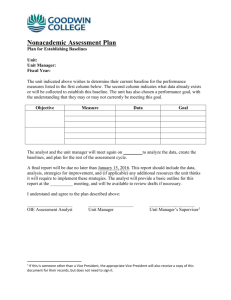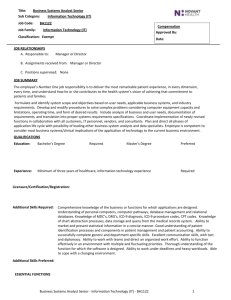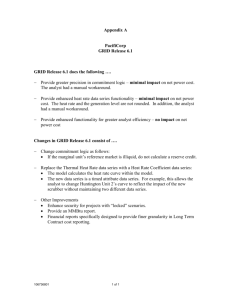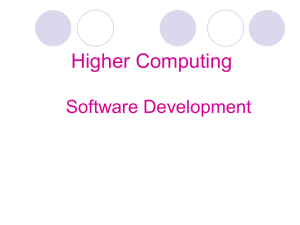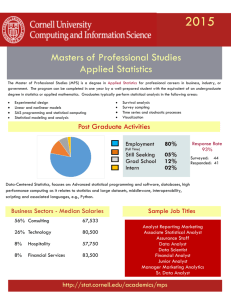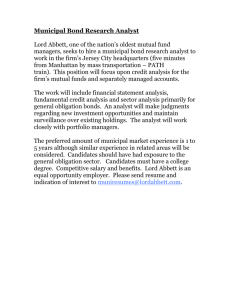Senior Information Technology Systems Analyst
advertisement
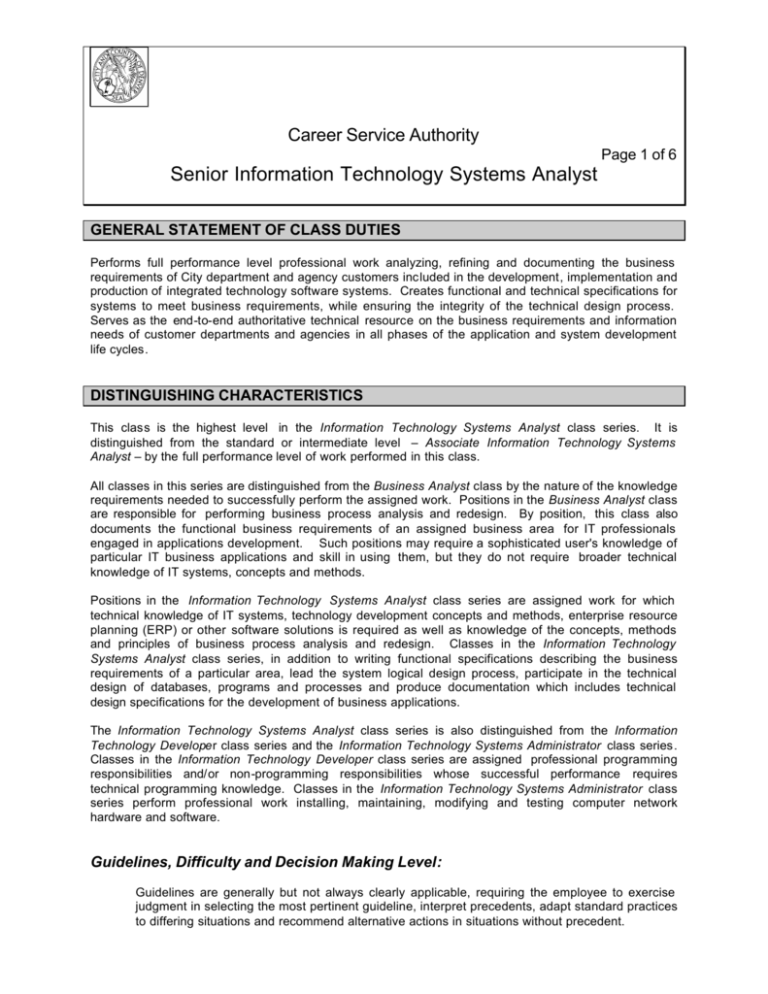
Career Service Authority Page 1 of 6 Senior Information Technology Systems Analyst GENERAL STATEMENT OF CLASS DUTIES Performs full performance level professional work analyzing, refining and documenting the business requirements of City department and agency customers included in the development, implementation and production of integrated technology software systems. Creates functional and technical specifications for systems to meet business requirements, while ensuring the integrity of the technical design process. Serves as the end-to-end authoritative technical resource on the business requirements and information needs of customer departments and agencies in all phases of the application and system development life cycles. DISTINGUISHING CHARACTERISTICS This class is the highest level in the Information Technology Systems Analyst class series. It is distinguished from the standard or intermediate level – Associate Information Technology Systems Analyst – by the full performance level of work performed in this class. All classes in this series are distinguished from the Business Analyst class by the nature of the knowledge requirements needed to successfully perform the assigned work. Positions in the Business Analyst class are responsible for performing business process analysis and redesign. By position, this class also documents the functional business requirements of an assigned business area for IT professionals engaged in applications development. Such positions may require a sophisticated user's knowledge of particular IT business applications and skill in using them, but they do not require broader technical knowledge of IT systems, concepts and methods. Positions in the Information Technology Systems Analyst class series are assigned work for which technical knowledge of IT systems, technology development concepts and methods, enterprise resource planning (ERP) or other software solutions is required as well as knowledge of the concepts, methods and principles of business process analysis and redesign. Classes in the Information Technology Systems Analyst class series, in addition to writing functional specifications describing the business requirements of a particular area, lead the system logical design process, participate in the technical design of databases, programs and processes and produce documentation which includes technical design specifications for the development of business applications. The Information Technology Systems Analyst class series is also distinguished from the Information Technology Developer class series and the Information Technology Systems Administrator class series. Classes in the Information Technology Developer class series are assigned professional programming responsibilities and/or non-programming responsibilities whose successful performance requires technical programming knowledge. Classes in the Information Technology Systems Administrator class series perform professional work installing, maintaining, modifying and testing computer network hardware and software. Guidelines, Difficulty and Decision Making Level: Guidelines are generally but not always clearly applicable, requiring the employee to exercise judgment in selecting the most pertinent guideline, interpret precedents, adapt standard practices to differing situations and recommend alternative actions in situations without precedent. Senior Information Technology Systems Analyst Page 2 of 6 Duties assigned are generally complex and may be of substantial intricacy. Work assignment is performed within an established framework under general instructions but requires simultaneous coordination of assigned functions or projects in various stages of completion. Employee is responsible for determining time, place and sequence of actions to be taken. Unusual problems or proposed deviations from guidelines, practices or precedents may be discussed with the supervisor before being initiated. Level of Supervision Received and Quality Review: Under general supervision, the employee receives assignments and is expected to carry them through to completion with substantial independence. Work is reviewed for adherence to instructions, accuracy, completeness and conformance to standard practice or precedent. Recurring work clearly covered by guidelines may or may not be reviewed. Interpersonal Communications and Purpose: Contacts with the public or employees where explanatory or interpretive information is exchanged, defended, gathered and discretion and judgment are required within the parameters of the job function. Level of Supervision Exercised: Performs project or operational leadwork. May supervise subprofessional staff or contract employees. ESSENTIAL DUTIES Plans and performs business process analysis of major business activities and functions in assigned departments and agencies and guides the subsequent design and implementation or improvement of integrated technology solutions. Serves as team lead for assigned larger and/or non-routine projects, working with cross-functional teams to address and analyze business requirements and automated systems issues, along with other developmental aspects of assigned projects. Leads and/or performs requirements gathering, functional decomposition, workflow analyses and logical system design tasks necessary to provide a complete solution for resolving business problems and exploiting integrated technology opportunities. Depending on business areas, applications supported and applicable technologies, this may include: • • • • • • • • performing packaged software gap analysis. performing system set up and configuration activities. performing work flow analysis and/or implementing workflow automation. designing/prototyping user interfaces. designing and creating reports or data marts. performing systems analysis and logical design activities such as data modeling, entityrelationship diagramming, CRUD (create, revise, update and delete) analysis and logical database design. performing object oriented analyses such as domain analysis, event lists, class models, business use cases and activity diagrams. creating technical design specifications. Senior Information Technology Systems Analyst Page 3 of 6 Coordinates and participates in the planning, development and implementation of automated business systems in an effort to align information technology solutions with customer business requirements and initiatives. Identifies business application and integrated technology opportunities and solutions for resolving business problems. Reviews and obtains approval of IT service delivery designs, business application and automation prototypes and design specifications. Plans and executes unit, integration and acceptance testing; writes departmental and agency system documentation; develops and writes training documentation and trains department and agency customers. Develops or assists with the development of cost estimates, cost/benefit analyses and IT project justifications; develops or assists with the development of funding requests and proposals. Identifies security and application access needs for department and agency customers; assists with the development of departmental and agency security definitions and profiles; assists with the maintenance of security authorizations; and identifies and develops recommendations for other system controls. Advises customers on best practices, application customizations and interface strategies. customizations where needed in collaboration with the customer and the technical team. Designs Coordinates pilot and roll out planning, user enhancement requests and defect tracking. Utilizes generic tools to analyze and manage data. Performs other related duties as assigned or requested. Any one position may not include all of the duties listed. However, the allocation of positions will be determined by the amount of time spent in performing the essential duties listed above. MINIMUM QUALIFICATIONS Competencies, Knowledges & Skills: Reasoning - Identifies rules, principles or relationships that explain facts, data or other information; analyzes information and makes correct inferences or draws accurate conclusions Problem Solving - Identifies problems; determines accuracy and relevance of information; uses sound judgment to generate and evaluate alternatives and to make recommendations. Technical Competence - Uses knowledge that is acquired through formal training or extensive on the job experience to perform one's job; works with, understands and evaluates technical information related to the job; advises others on technical issues. Customer Service - Works with clients and customers to assess their needs, provide information or assistance, resolve their problems or satisfy their expectations; knows about available products and services; is committed to providing quality products and services. Teamwork - Encourages and facilitates cooperation, pride, trust and group identity; fosters commitment and team spirit; works with others to achieve goals. Senior Information Technology Systems Analyst Page 4 of 6 Self Management - Sets well defined and realistic personal goals; displays a high level of initiative, effort and commitment towards completing assignments in a timely manner; works with minimal supervision; is motivated to achieve; demonstrates responsible behavior. Flexibility - Is open to change and new information; adapts behavior or work methods in response to new information, changing conditions or unexpected obstacles; effectively deals with ambiguity. Creative Thinking - Uses imagination to develop new insights into situations and applies innovative solutions to problems; designs new methods where established methods and procedures are inapplicable or are unavailable. Knowledge of methods, metrics, tools and techniques of business process reengineering. Knowledge of the business value of information and the processes for making data available and useful to decision-makers. Knowledge of systems development life cycle (SDLC) concepts used to plan, develop, implement, operate and maintain information systems, including knowledge of computeraided software engineering (CASE) tools. Knowledge of principles and methods to identify, analyze, specify and design technology solutions that meet the client's functional requirements, including translating functional requirements into technical requirements. Knowledge of architectural methodologies for information systems or applications design and development. Knowledge of database management systems and their application. Knowledge of principles, methods and tools for analyzing and developing test and evaluation procedures. Knowledge of the principles and methods of web technologies, tools and delivery systems. Knowledge of reporting tools, including data transformation and business intelligence reporting tools, including online analytical processing (OLAP) tools. Skill in trouble shooting production issues and in the use of trouble shooting and trace tools. Skill in utilizing the principles and practices of effective and persuasive communication to elicit information, negotiate problem resolution and/or garner support for various programs. Skill in establishing and maintaining working relationships with both internal and external customers – other employees, organizations and the public. Skill in mapping business processes and comparing those processes to industry best practices. Skill in synthesizing complex technical information and communicating it clearly to non-technical audiences. Skill in preparing documentation and complex reports which are clear, concise and present information in a well-organized and efficient manner in both written communications and oral presentations. Skill in facilitating requirement meetings and in accurately compiling and managing requirements, issues and associated team action items. Senior Information Technology Systems Analyst Page 5 of 6 Skill in mentoring staff and associate analysts and promoting team efforts. Physical Demands: Sitting: remaining in the normal seated position. Handling: seizing, holding, grasping or otherwise working with hand(s). Fingering: picking, pinching or otherwise working with fingers. Talking: expressing or exchanging ideas by means of spoken words. Hearing: perceiving the nature of sounds by the ear. Repetitive motions: making frequent movements with a part of the body. Eye/hand/foot coordination: performing work through using two or more. Working Environment: Work is primarily performed in an office setting and frequently at other locations for meetings. Work involves pressure due to multiple calls and inquiries and is subject to interruption. Education Requirement: Baccalaureate Degree in Computer Science, Information Systems, Business Administration, Mathematics or a related field. Experience Requirement: Three years of professional level experience working on an integrated technology software system development and/or production support team. Two years of this experience must have included performing project leadwork for routine projects and/or projects that are limited in scope as a member of cross-functional teams to address and analyze business requirements and automated systems issues, along with other development al aspects of assigned projects. Education/Experience Equivalency: A combination of the appropriate type and level of education and experience may be substituted for the minimum education and experience requirements. Licensure and/or Certification: None CLASS DETAIL FLSA CODE: Exempt ESTABLISHED DATE: 04/01/2004 ESTABLISHED BY: Paul Wiberg REVISED DATE: 08/05/2007 Senior Information Technology Systems Analyst Page 6 of 6 REVISED BY: Paul Wiberg CLASS HISTORY 08/05/2007 Language of the education requirement and the education/ experience equivalency requirement changed to provide more clarity and consistency with other CSA professional IT series requirements.

